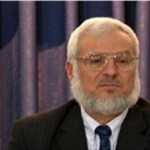Monday
Jan252010
UPDATED Israel-Palestine: George Mitchell's "Fail, Fail, Fail" Middle East Tour?
 Monday, January 25, 2010 at 7:00
Monday, January 25, 2010 at 7:00  UPDATE 25 JANUARY: Following a second meeting with Israel's Defense Minister Ehud Barak in Tel Aviv on Saturday night, US Mideast special envoy George Mitchell met with Prime Minister Benjamin Netanyahu on Sunday morning. Netanyahu said after the discussions that "new and interesting ideas" were raised for the resumption of peace talks with the Palestinians. However, he offered no details.
UPDATE 25 JANUARY: Following a second meeting with Israel's Defense Minister Ehud Barak in Tel Aviv on Saturday night, US Mideast special envoy George Mitchell met with Prime Minister Benjamin Netanyahu on Sunday morning. Netanyahu said after the discussions that "new and interesting ideas" were raised for the resumption of peace talks with the Palestinians. However, he offered no details.During the weekly cabinet meeting, Netanyahu repeated, "I expressed my hope that these new ideas will allow for the renewal of the (negotiating) process."
The start of US Middle East envoy George Mitchell's trip to the Middle East this week wasn't too bad. He stopped in Lebanon to declare that the country would play a key role in efforts to build lasting and comprehensive peace and stability in the Middle East.
Israel-Palestine: United Nations “Stop the Occupation of East Jerusalem”
For the third time, Mitchell met with Syrian President Bashar Assad in Damascus. That brought the standard You're Very Important line as well: "Syria, certainly has an important role to play in all these efforts, as do the US and international community."
Then the Middle East road got bumpy. On Thursday, Mitchell held meetings with Israeli President Shimon Peres, Defense Minister Ehud Barak, Foreign Minister Avigdor Lieberman and Prime Minister Benjamin Netanyahu. The US envoy put out President Obama's vision of a Palestinian state alongside Israel in peace, "We will pursue (that) until we achieve that objective." In Washington, Secretary of State Hillary Clinton's statement seemed to be guarding against bad news from the West Bank:
This issue is between Israel and the Palestinians. The US, UK, EU and the Arab League, everybody can work together to create a positive atmosphere, we will continue to do whatever we can, and we urge both parties to return to the negotiations table.
And on Friday afternoon, Mitchell faced that challenge when he finally met with Palestinian Authority leader Mahmoud Abbas. Abbas was insistent on a full settlement freeze in West Bank and East Jerusalem before re-starting peace talks, and following the meeting, chief Palestinian negotiator Saeb Erekat said:
When we say a settlement freeze that includes Jerusalem, that is not a Palestinian condition. That is rather an Israeli obligation, and the same thing is applicable to our demand to have negotiations resume where we left them in December 2008.
Israel's Netanyahu, hwoever, put the ball in the court of Ramallah and called on the Palestinian Authority to "stop wasting time talking about how to enter the peace process." A statement released by the Prime Minister's office declared:
The Palestinian Authority are the ones that are preventing the re-launch of the peace process with their preconditions that they have never asked before from any previous Israeli government. The Prime Minister calls on the Palestinian Authority to sit at the negotiating table and discuss ways to promote security, peace, and prosperity for the two people.

